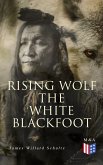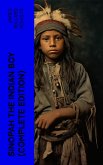In 'Rising Wolf the White Blackfoot' by James Willard Schultz, readers are plunged into the captivating world of the Blackfoot tribe through the moving account of Hugh Monroe, a man who becomes a part of the tribe and goes on to earn the name Rising Wolf. Schultz's book is a poignant blend of history and fiction, as he expertly weaves together cultural details and personal relationships to create a rich narrative that offers insight into the customs and beliefs of the Blackfoot people. The book is written in a lyrical and descriptive style, immersing readers in the landscape and traditions of the tribe. Schultz's attention to detail and authenticity make 'Rising Wolf the White Blackfoot' a valuable contribution to Native American literature, shedding light on a culture that is often misunderstood. James Willard Schultz, also known as Apikuni, was a noted author and historian who lived among the Blackfoot tribe in the late 19th and early 20th centuries. His intimate knowledge of Native American culture and his deep respect for the traditions of the Blackfoot people are evident in his writing, making him a trusted voice on the subject. Schultz's personal experiences and relationships within the tribe undoubtedly shaped his perspective and inspired him to share the stories of the Blackfoot people with a wider audience. I highly recommend 'Rising Wolf the White Blackfoot' to readers interested in Native American history, as well as those who appreciate rich storytelling and cultural immersion. Schultz's masterful blend of fact and fiction makes this book a compelling and informative read that offers a unique perspective on the Blackfoot tribe and their way of life.
Dieser Download kann aus rechtlichen Gründen nur mit Rechnungsadresse in A, B, BG, CY, CZ, D, DK, EW, E, FIN, F, GR, H, IRL, I, LT, L, LR, M, NL, PL, P, R, S, SLO, SK ausgeliefert werden.









